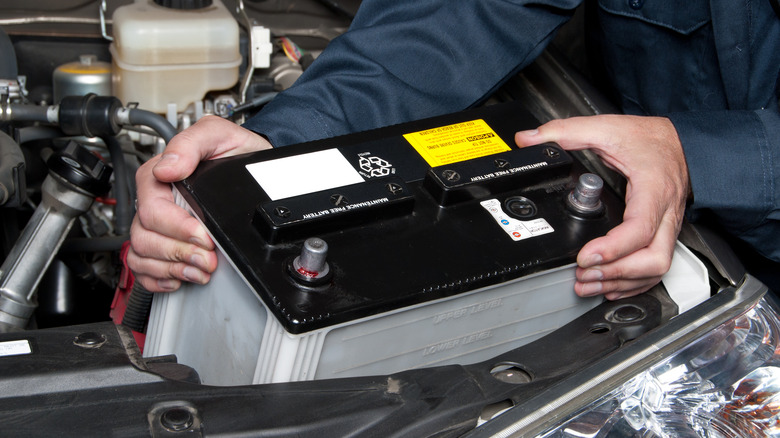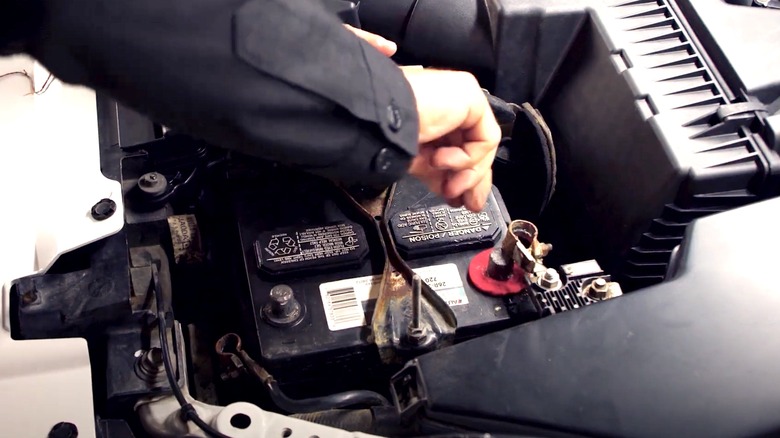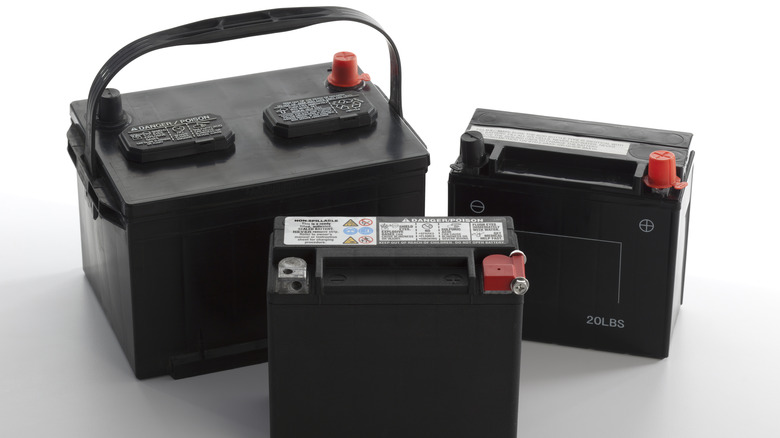Are Car Batteries Universal? What You Need To Know
Few things can be more frustrating for a car owner than a dead battery. That's in no small part due to the relatively helpless feeling that tends to accompany being stranded without a functional automobile, particularly if you're in a more isolated locale when your engine fails to turn over. On top of that, even if you are prepared and have a set of jumper cables handy in your trunk, there is no guarantee that the battery will power up enough to crank.
Of course, even if your car does crank after properly jumping the battery, it might still be a good idea to go ahead and replace the component to ensure there are no further issues in the immediate future — at least no issues that aren't user related. But even after you've determined that your battery is dead or generally in need of replacing, the mere act of selecting, purchasing, and installing a new one can rank among the more confusing aspects, because there are countless brands and builds to choose from these days.
If you're even a little bit mechanically inclined, you can likely handle flipping out your dead car battery for a new one without much trouble. You will, however, need to be careful about which battery you select for your vehicle, as there's no such thing as a universal fit, and outfitting your car with an ill-suited power source could lead to further problems.
Battery requirements are often specific to your vehicle's make and model
There is, of course, one major similarity in most car batteries, in that they are generally set to provide 12 volts of power to your vehicle. While the power output levels are about the same from one battery to the next, the batteries themselves can be quite different. That's particularly true these days, with many hybrid and electric cars, trucks, and SUVs utilizing Lithium-ion batteries as a power source. So, if you are driving a hybrid or electric car powered by a Lithium-ion source, it's important that you purchase one of those batteries when it's time for a new one.
As for standard, combustion-powered engines, they tend to operate using SLI batteries, which stands for "starting, lighting, and igniting." Said label is pretty self-explanatory, as SLI batteries are designed to provide power for those three primary functions in a vehicle. There's also the Valve Regulated Lead Acid (VRLA) option to choose from for gas-fueled cars, which may be of interest to some as their sealed design generally requires less upkeep than their SLI counterparts.
Alternate designs aside, the voltage output of these batteries is pretty much the same across the board. The actual size of the batteries can, however, vary dramatically. Given that there's a finite amount of space for a battery under the hood, the tray holding it in place is designed for a specific size. Please trust us when we say that purchasing a battery that doesn't fit the tray in your vehicle is a frustration you never want to experience.
How to choose the right battery for your vehicle
When you're choosing your replacement car battery, you may also need to account for the climate in your region, since some battery makers offer an option ideal for cold-weather cranking. Likewise, it should go without saying that the size of your vehicle and engine may influence the size of battery needed. A pickup truck may have different requirements for cranking and powering various entertainment and safety features than a sporty little hatchback. Yes, there are even different connection types to consider from one battery to the next.
It can be intimidating to account for all that information, but there are a couple of sure fire ways to ensure you purchase the correct battery for your car. The first is, obviously, the owner's manual that's likely been left untouched in your glove box since the day you drove the vehicle off the lot. There is indeed a whole section in that owner's manual dedicated to its battery requirements, and it will tell you the exact specs of the component you need to properly crank and operate the vehicle.
Likewise, if you purchased the car, truck, or SUV new, it's likely that the battery under the hood is the very one installed by the manufacturer. So, if you want to be certain you're replacing it with the correct battery, you can always just purchase the exact same model. If all else fails, you can also merely seek help from an automotive professional, who will no doubt be happy to help you sort through the fuss and find the right battery for your vehicle.


